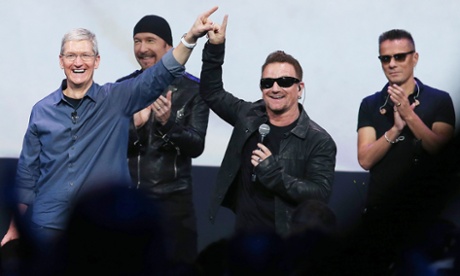
Apple has responded to criticism of its deal to give away U2’s new album to iTunes users by making it easier for them to delete the tracks, if they don’t want them.
The Irish band released the album – Songs of Innocence – last week as a free download for iTunes users, as part of Apple’s launch event for its new iPhones and Apple Watch.
However, anyone who had turned on the “Automatic Downloads” feature in their iTunes software, iPhone or iPad got it pushed to their device whether they wanted it or not, sparking complaints when people discovered it was not as easily removed.
As of tonight, iTunes users can delete the tracks more easily by clicking on this link, which takes them to a dedicated removal page for Songs of Innocence:
“If you would like U2’s Songs of Innocence removed from your iTunes music library and iTunes purchases, you can choose to have it removed,” explains the web page. “Once the album has been removed from your account, it will no longer be available for you to redownload as a previous purchase.”
“Some customers asked for the ability to delete ‘Songs of Innocence’ from their library, so we set up itunes.com/soi-remove to let them easily do so,” Apple spokesperson Adam Howorth told The Guardian. “Any customer that needs additional help should contact AppleCare.”
The move addresses complaints from (non) fans and critics alike, with New Yorker writer Sasha Frere-Jones the most prominent in the latter category. “Lack of consent is not the future,” he wrote, while advising U2 not to “shove your music into people’s homes”.
Rapper Tyler, the Creator expressed similar sentiments in rather-more-earthy language:
GET OFF MY FUCKING PHONE. YOU COULDNT COME UP WITH AN ACTUAL MARKETING IDEA? FUCK @U2 I DONT WANT YOU. FUCK BONO. I DIDNT ASK FOR YOU IM MAD
— Tyler, The Creator (@fucktyler) September 12, 2014
U2’s manager Guy Oseary defended the move, in an interview with Mashable. “It’s a gift from Apple. If someone doesn’t like the gift, they should delete it,” he said, in response to criticism. “We just want to share it with as many people as possible. If you don’t want it and you don’t need it, delete it.”
That was exactly what many iOS users discovered they couldn’t do through the usual slide-to-delete mechanism in their devices’ Music app, although they could visit the “Purchased” screen within the iTunes desktop software to hide it from their collections, as a workaround.
• Has rock’n’roll finally sold out with U2’s Apple stunt?
• Stop whining about the U2 album: hating Bono is more annoying
• U2’s Apple launch: what it means for the band and company
Apple has yet to announce how many copies of Songs of Innocence have been downloaded since the album was made available on 9 September, other than declaring its aim to make it free for all 500m-plus active iTunes customers.
Three days later, technology news site Recode claimed that U2’s album had been downloaded more than 2m times, although it did not specify whether this included multiple downloads by individual fans to their various devices, or what percentage of these downloads were automatic, rather than manual.
The giveaway may have been controversial, but it appears to have stimulated interest in U2’s back catalogue. Within days of the Songs of Innocence release, 26 of the band’s albums were appearing in Apple’s iTunes Top 200 chart in the US.
However, an aggressive price promotion on the back catalogue – many of the albums were dropped to $5.99 on the US store – has played a part in that too.
It may now be easier to delete Songs of Innocence from your iTunes library, but with Apple reportedly planning a $100m marketing campaign around the album, there will surely be a few million more free downloads before the giveaway period runs out on 13 October.
Oseary has already signified more plans for U2 and Apple to work together. “We’re working on other things as well with Apple that have to do with how music is heard and innovation,” he told trade magazine Billboard.
“There’s a lot of things still to come that are really interesting. The band really wants people to engage with albums, they want them to support the art form of artwork and lyrics and video content and just get into their music in a much different way than an MP3 file. This is a long relationship.”
That relationship is spurring Apple’s rivals in the digital music world to stress their own credentials as partners for younger artists.
Google has been giving away a free download of Demi Lovato’s last album this month through its Google Play store, while streaming service Spotify has issued a flurry of announcements about dance star Calvin Harris over the last week.
First, it revealed that his Summer single was its most-streamed track of the summer; then announced that he’d passed 1bn streams overall on its service; and finally claimed that his Blame track had become the first song ever to be streamed more than 10m times in a single week on Spotify.
Apple, Spotify and rivals are gearing up for a battle over the coming months and years for exclusives from popular artists – or in Spotify’s case, a battle to convince artists not to give lengthy exclusives to Apple.
U2’s album is an iTunes-only affair until 13 October at the earliest, but many artists are picking and choosing complementary partnerships. Harris, for example, has been feted by Spotify, but also played Apple’s iTunes Festival in London this month.
• Apple iTunes exec: ‘Creatively, we really believe in albums’

